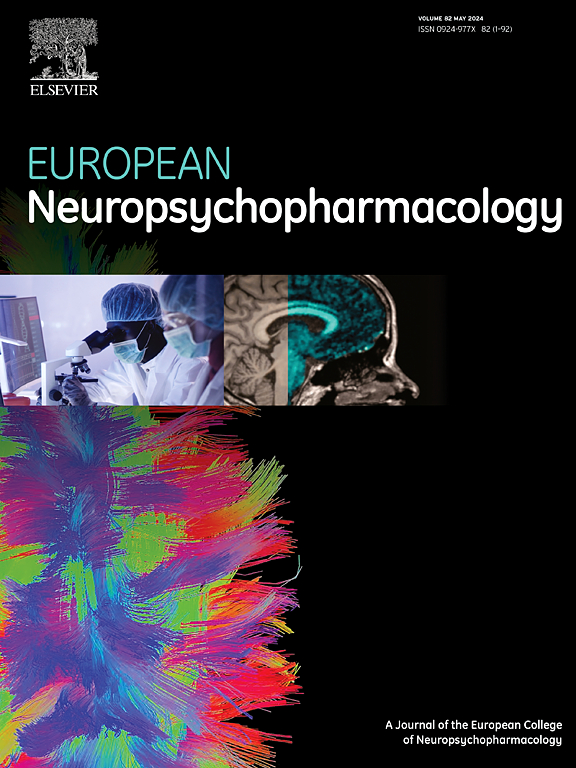糖皮质激素相关基因中孕产妇痛苦的胎盘表观遗传学特征与新生儿结局:对西班牙初产妇的研究。
IF 6.7
2区 医学
Q1 CLINICAL NEUROLOGY
引用次数: 0
摘要
孕期母体的压力会影响后代的健康,增加患神经精神疾病的风险。人类胎盘在了解这种影响方面起着至关重要的作用,它连接着母体和胎儿的血液循环,影响着胎儿的发育。我们的假说集中于母体压力通过胎盘 DNA 甲基化影响儿童的结果,目标是三个皮质醇调节基因:NR3C1、FKBP5 和 HSD11B2。在这项试验性研究中,通过靶向亚硫酸氢盐测序分析了45对母婴(根据母婴压力暴露程度分为高/低两组)的绒毛和母体蜕膜胎盘层中相关基因的DNA甲基化情况。孕妇每天提供四份唾液样本用于皮质醇测定,并在怀孕三个月的每个阶段对是否存在抑郁症状进行评估。新生儿在 7 周时接受神经发育评估和唾液皮质醇评估。在绒毛样本中,妊娠头三个月母体昼夜皮质醇水平的升高与NR3C1基因外显子1D的DNA甲基化升高和FKBP5基因内含子7的DNA甲基化降低有显著关联。母体蜕膜中 FKBP5 基因内含子 1 和 7 的 DNA 甲基化升高与预产期密切相关。在所有胎盘样本中,HSD11B2 启动子区域的 DNA 甲基化程度都很低。没有发现与新生儿神经发育有关的关联。这些结果强调了在不同妊娠阶段探索特定层甲基化差异的重要性,突出了整个产前期间母体压力、胎盘表观遗传修饰和胎儿发育之间复杂的相互作用。本文章由计算机程序翻译,如有差异,请以英文原文为准。
Placental epigenetic signatures of maternal distress in glucocorticoid-related genes and newborn outcomes: A study of Spanish primiparous women
Maternal stress during pregnancy can impact offspring health, increasing the risk of neuropsychiatric disorders. The human placenta plays a crucial role in understanding this effect, influencing fetal programming as it connects maternal and fetal circulation. Our hypothesis centers on maternal stress influencing children's outcomes through placental DNA methylation, targeting three cortisol-regulating genes: NR3C1, FKBP5, and HSD11B2.
In this pilot study, chorionic villi and maternal decidua placental layers from 45 mother-infant dyads (divided into two groups based on high/low maternal stress exposure) were analyzed for DNA methylation at the genes of interest via targeted bisulfite sequencing. Pregnant women provided four saliva samples throughout a day for cortisol determinations and were assessed for the presence of depressive symptoms at each of the three trimesters of pregnancy. Newborns underwent neurodevelopmental assessments and salivary cortisol evaluations at 7 weeks.
Increased maternal diurnal cortisol levels in the first trimester of pregnancy was significantly associated with elevated DNA methylation at exon 1D of the NR3C1 gene and lower DNA methylation at intron 7 of the FKBP5 gene, both in chorionic villi samples. Elevated DNA methylation at introns 1 and 7 of FKBP5 in the maternal decidua were strongly linked to an anticipated delivery. DNA methylation at the HSD11B2 promoter region was uniformly low across all placental samples. No associations with newborn neurodevelopment were found.
These results emphasize the importance of exploring layer-specific methylation differences at distinct pregnancy stages, highlighting the complex interplay between maternal stress, placental epigenetic modifications, and fetal development throughout the prenatal period.
求助全文
通过发布文献求助,成功后即可免费获取论文全文。
去求助
来源期刊

European Neuropsychopharmacology
医学-精神病学
CiteScore
10.30
自引率
5.40%
发文量
730
审稿时长
41 days
期刊介绍:
European Neuropsychopharmacology is the official publication of the European College of Neuropsychopharmacology (ECNP). In accordance with the mission of the College, the journal focuses on clinical and basic science contributions that advance our understanding of brain function and human behaviour and enable translation into improved treatments and enhanced public health impact in psychiatry. Recent years have been characterized by exciting advances in basic knowledge and available experimental techniques in neuroscience and genomics. However, clinical translation of these findings has not been as rapid. The journal aims to narrow this gap by promoting findings that are expected to have a major impact on both our understanding of the biological bases of mental disorders and the development and improvement of treatments, ideally paving the way for prevention and recovery.
 求助内容:
求助内容: 应助结果提醒方式:
应助结果提醒方式:


